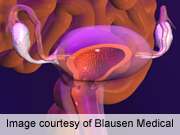There does not appear to be an increased risk for complications in twin pregnancies with fibroid tumors compared with those without fibroid tumors, according to research published in the January issue of the American Journal of Obstetrics & Gynecology.
(HealthDay)—There does not appear to be an increased risk for complications in twin pregnancies with fibroid tumors compared with those without fibroid tumors, according to research published in the January issue of the American Journal of Obstetrics & Gynecology.
To estimate the risk of adverse obstetric outcomes associated with fibroid tumors in twin pregnancies, Molly J. Stout, M.D., of the Washington University School of Medicine in St. Louis, and colleagues conducted a retrospective cohort study involving 2,378 non-anomalous twin pregnancies with one or more fibroid tumors identified using ultrasound in the second trimester.
Overall, 2.3 percent of the pregnancies had fibroid tumors. Compared with twin pregnancies without fibroid tumors, the researchers found that the presence of fibroid tumors was not associated with increased odds of small-for-gestational-age growth, preterm delivery before 34 weeks of gestation, or other adverse outcomes.
"This investigation suggests that twin pregnancies with fibroid tumors are not at increased risk for adverse obstetric outcomes beyond that which exists for twin gestations without fibroid tumors. Specifically, adverse outcomes that previously were demonstrated in cohorts of singleton pregnancies with fibroid tumors are not seen in this cohort of twin pregnancies with fibroid tumors," the authors write. "Screening strategies that are already in place for women with twin pregnancies do not need to be altered based on the presence or absence of fibroid tumors."
More information:
Abstract
Full Text
Journal information: American Journal of Obstetrics and Gynecology
Copyright © 2013 HealthDay. All rights reserved.


















